- Home
- Michael Cunningham
Golden States Page 9
Golden States Read online
Page 9
He walked down the street, checking it out. The bird screeched again, and he wondered what kind of bird it was. Everything in the world had a name. He resolved to learn more of them than he knew; he didn’t even know the name of the tree in his own backyard. He thought he would feel less strange and overwhelmed by things if he knew better what to call them. As he walked along, he speculated over the names of the trees that lined his street. Under the trees were cars, and he ticked off their names. Cougar, Firebird, Country Squire, Rabbit.
When he first noticed the man sleeping in the car a chill shot through him. The fact that someone was in one of the cars, with his head propped against the window, impressed itself upon him. He jumped, and the blood rose singing to his head. A man. There. His focus blurred, took in nothing but black hair inside a brown car, then sharpened again.
It was Rob. He sat behind the wheel, asleep with his head reared back and his mouth half open. David approached the car cautiously. He had seen Rob plenty of times before, most recently at Christmas, but didn’t remember his head being so big. The sun caught Rob’s face in profile, turning his beard stubble the color of copper wire. He wore a gray suit, and a dark red tie covered with little circles like wagon wheels. The top button of his blue shirt was open, revealing a riot of illuminated red hairs that turned black and burnt-looking as they disappeared into the shirt.
David could not think of what to do. His first impulse was to call the police. His second impulse was to get Mom. But if he woke Mom, Janet would know about it too, and she had a bad habit of feeling sorry for Rob.
Hesitantly, almost against his will, David crossed over to the driver’s side and tapped on the window. He tapped toosoftly, and Rob didn’t stir, so he tapped again, this time too hard.
Rob jolted awake and looked frantically at David. When he turned David could see that he had a black eye, swollen and dark as a plum, yellow at the edges.
David jumped back. He recovered himself a moment before Rob did, and took a half step forward. He could not think of what to say.
Rob thought of what to say. An opaque shallow-bottomed sureness rose into his good eye, replacing the terrified glitter, and he rolled down the window and said, “Morning, David, my friend.”
David stood hovering between courtesy and murder, his own eyes bleary with an agitation that was like tears. Rob’s face was fattish around the jaw, and his lips were too red for his white, white skin. He was not, David thought, what you could call handsome.
“What are you doing?” David heard himself ask.
“Sleeping,” Rob said, and grinned. His small teeth were as square as products off a factory line. When he smiled he showed a stripe of puffy darkish gums.
“What happened to your eye?” David said.
“Minor altercation,” Rob told him. “You should have seen the other guy.”
“Oh. Well, you shouldn’t sleep here.”
“Question of zoning?” Rob scrubbed his good eye with his finger.
“Janet doesn’t want to see you,” David said.
“Is that what she told you?” Rob opened his eye again. He looked at David as if he could see something meaningful on David’s forehead.
“Uh-huh,” David said to the curb.
“Well, sometimes women don’t mean just exactly what they say, or say just what they mean. What if you and I went andhad a cup of hot chocolate somewhere, and talked about women?”
“Did you drive down from San Francisco?” David asked.
“Yes I did. I stepped out of my office and got in my car and came straight here from work. That’s just what I did.”
There was something of Janet in the way he spoke. David couldn’t put his finger on it; it had to do with rhythm, or something. Rob smiled again, showing his teeth and gums in a proud, satisfied way, as if he’d swallowed Janet whole.
“Oh,” David said, shifting his weight from foot to foot.
“What do you say to a cup of hot chocolate?” Rob said. “I’ll buy.”
David hesitated, then said, “Okay,” because he couldn’t think of how to say no to anyone as big and insistent as Rob, and because he was flattered to be asked by anyone to do anything. His cheeks burned with the knowledge that his vanity made him too easy.
“Good,” Rob said. He patted the passenger seat beside him. “Hop in.”
“We can walk,” David said. “There’s a place over at the Plaza.” He silently congratulated himself on staying out of Rob’s car, which he noticed was a Celica.
“Okay,” Rob said. He opened the door, stood, and stretched. David had not remembered him being so tall. Rob’s spine cracked, and he rubbed his neck. “Jesus,” he murmured. “Never let yourself get as old as I am, my friend.”
“Okay,” David said. He turned and set out walking toward the Plaza, anxious to put a little distance between himself and Rob’s height. Rob caught up with him in one loping stride.
“Nice morning,” Rob said.
“Uh-huh,” David said, hurrying along.
“What are you in now, the fifth grade?”
“Sixth,” David said.
“Oh. Sorry.”
“It’s all right.”
They walked the rest of the way in absorbed silence. Rob walked in a loose-footed, reared-back way that didn’t match his suit or his haircut. David could hear him breathing, in short breathy snorts like a horse. David thought with pride of how he could probably outrun Rob, even though his hips barely came up to the middle of Rob’s thighs.
The Plaza when they reached it was nearly empty, its parking lot vast and sun-dazzled. The Burger King stood apart, at a remove from the Plaza proper, sharing a corner with the Cinema Twin. It alone was open for business, its glowing yellow sign made pale and greenish by the sky. David made to push open the swinging glass door but Rob reached over his head and touched it first, opening it for both of them while David’s outstretched hand pushed empty air. He nearly stumbled on a ribbed rubber mat.
Hardly anyone was in the place, just a few men in suits, men with a certain sad, displaced look. The Burger King was spotless, all its surfaces scrubbed clean and its floor swept, the plastic wood-grain tables and molded orange chairs looking content and natural in the absence of people. It was a pretty sight.
David and Rob went up to the counter, to order from a sharp-nosed woman whose name, according to her badge, was Faith. “What’ll it be, my friend?” Rob asked.
“Coffee,” David said. Rob looked at him doubtfully, eyebrows lifted, and David said, “Coffee” again, this time directly to the woman named Faith.
“Okay. One coffee and one tea,” Rob said. “You don’t have any herb teas, do you?”
“Nope,” Faith said scornfully. David agreed with her. To ask for something like that at a Burger King was stupid.
Faith rang it up on the register, and David reached automatically into his pockets, though he knew he didn’t have any money. Rob raised his hand, flat, like a cop stopping traffic, andsaid, “On me.” David felt a tick of gratitude for which he was instantly ashamed.
When Faith brought the coffee and the tea, two cardboard cups sealed over with white plastic lids, Rob gave her a limp dollar bill from his wallet, which had cowboy designs stamped onto it. Curlicues and steer skulls. David put his hands around one of the cups, absorbing its heat, which made him feel stronger. He took his cup, along with the white plastic tubs of cream and the envelopes of sugar, and guided Rob to a table at a window on the neighborhood side, overlooking the slant tile roofs and sun-gilded TV antennas of home.
In silence, they peeled the lids off their cups, which yielded with small sucking sounds. David poured the two creams and all four envelopes of sugar into his. The cream turned his coffee a mottled khaki, and he lifted it tentatively to his lips. The smell and heat assaulted him. Eying Rob, he let the coffee creep against his upper lip. It worked its way between his teeth, and he summoned every thread of will he had to keep from grimacing.
“So. I’ll bet you’re surprise
d to see me,” Rob said.
“Uh-huh.”
“I’m a little surprised to be here.” He grinned and glanced around the Burger King, pleased with himself for being there. In the fluorescent light his black eye looked worse; it looked like something he was dying of. David squinted one eye and focused on Rob’s bad side.
“You’re going to miss work today,” David said.
“I’ve always suspected the practice of law could go on without me for a day. How’s Janet?”
“She’s okay.”
“Has she been going out a lot?”
David looked into his coffee. He knew he ought to confess, but he couldn’t. He couldn’t stand to topple that far over into the wrong. “I don’t know,” he said.
“Well, I’m here now,” Rob said. He looked doubtfully at thebacks of his hands, as if he suddenly wondered whether he was really here at all.
Neither of them spoke for a while. David noticed that his coffee was unsteady in the cup, and realized he was jiggling his legs furiously against the single post that held up the table.
“Sometimes you have to take action,” Rob told him finally. “I think maybe I haven’t taken enough action in the past.” David nodded sympathetically, and wished he hadn’t. He concentrated on keeping his legs steady.
“Has Janet talked about me much?” Rob asked.
“I don’t know,” David said. “A little, I guess.”
“Well, I think it was definitely the right thing, coming down here like this. I wasn’t getting anywhere on the phone. Come on, let’s go talk to Janet.”
“She’s still sleeping,” David said. Rob jumped up, and David took both their cups, the cream tubs and empty sugar envelopes, and put them in the trash. The trash can had a swinging orange lid that said thank you in yellow letters.
They cut across the parking lot. David wondered what he could do to stop Rob from reaching the house. Rob wouldn’t have come if David hadn’t told those lies; it was a disgusting habit. Yet this particular story seemed truer to him than the idea of Janet’s marrying Rob. He wasn’t at all the type of man she would marry. She was much more likely to marry a man similar to the one in David’s head, somebody strong and tall who looked a little like David himself, an older David. She would go back to school and make up her classes and become a doctor and marry a good-hearted, gentle man who knew how to protect her if he had to.
The sun was high enough for the streets to look ordinary, unhaunted. Neither Rob nor David spoke, and Rob walked with such big strides that David had to trot every few paces to keep up. When they reached the house Rob started right across the lawn to the front door.
“Everybody’s still sleeping,” David said, running now at Rob’s side.
“Then we’ll wake them up,” Rob said. “It’s a beautiful morning, no one should miss a beautiful morning like this one.”
The door was locked, and David didn’t have a key. He dug in his pockets as if ordinarily he carried one but had forgotten it. Rob reached over his head and pressed the doorbell with a single businesslike stabbing motion. David saw that his fingernails were cut so short they looked painful.
Rob let a few seconds pass, then rang again. “They can hear you,” David said. “They’re just putting their robes on.”
Rob stood scowling, with his long finger pointed over the doorbell and his other hand buried in his pocket. David thought, suddenly, that he had helped bring everything bad in the world right here to the front door. He should have done something to prevent it.
“Who’s there?” Mom’s voice came uncertainly from behind the door. David knew she must be frightened.
“It’s Rob, Beverly,” Rob said, and his deep voice slit the morning air. David thought it must be audible to the end of the block. “I happened to find your son wandering around out here, and I brought him home.”
David felt like a hostage. To let him in, Mom would have to let Rob in too.
“Rob?” Mom said. “Schmidt? Janet’s Rob?”
“The same. Rob and David, two lost boys.”
“David? Are you out there?” Mom asked.
He paused, thinking of self-sacrifice. But he knew Rob would get in, one way or another. “Yes,” he said quietly, and said, “Yes” again.
Mom opened the door. She had on her white robe, and held an unlit cigarette between two fingers. She looked first at David, blankly; then she looked at Rob. Her face worked a beat too slowly into an expression of cordial surprise.
“Rob,” she said. She put the cigarette in her mouth and stared at Rob’s black eye.
“How are you, Beverly?” Rob said, extending his hand. “They still let me run around loose.” Mom put out her hand and let it be shaken. Rob squeezed her hand with quick gentle pressure, assuring her there was no danger anywhere. “Surprised to see me?” he asked.
“Oh no,” Mom said. “First I’m going to pour us both a cup of coffee and I’m going to light this cigarette, and then you can tell me how a man who lives five hundred miles away happens to show up at daybreak on my doorstep with my son.”
“David and I already had our first cup,” Rob said.
“Sure. He’s been drinking coffee ever since he turned twenty-one. Come in.”
The three of them walked through the dusky hallway to the kitchen, which was full of new light. “Janet’s still sleeping,” Mom said, “and Lizzie’s deciding on today’s outfit.”
“The house looks good,” Rob said.
“Still standing,” Mom said. She took the steaming kettle from the stove, took cups from the shelf.
“I don’t drink coffee anymore, Beverly,” Rob said. “You wouldn’t have any herb tea, would you?”
“I think the best I’ve got is Lipton’s.”
“That’s fine.”
Rob walked a slow circle around the kitchen, hands in his pockets. He paused before the refrigerator, and frowned over the cartoon held there by the plum-shaped magnet (an old man sitting dejectedly in a room full of balls, thirty or more of them, while his wife says, “Maybe you’re trying to juggle too many at once”).
“I hope you’ll pardon my appearance,” Rob said. “I didn’t have time to wash up.”
“What did you do, drive all night?” Mom said.
“Pretty much. I slept a couple of hours in my car out front, waiting until you all woke up.”
“Were you lurking in my garden last night?”
“No,” he said. “Why do you ask?”
“Never mind. Here.” She handed him a steaming cup of tea, its string and paper tab dangling over into the saucer.
“Thank you, Beverly,” Rob said. “You’re all right, you know?”
“Sure, I’m the Fourth of July. Why don’t you wait down here a minute and I’ll go wake Janet up. Cream’s in the refrigerator if you want it, and sugar’s in the little canister that says ‘Sugar.’ ”
“Thanks,” Rob said.
Mom left the room, taking her unlit cigarette with her. On her way she brushed David’s shoulder with her palm, tracing its shape, to remind him she remembered he was there.
“She’s great,” Rob said.
“I know,” David said. He went to the stove, poured himself a cup of hot water, and scooped freeze-dried coffee into it.
Rob looked over at the table in the breakfast nook, and seemed to consider sitting there, but didn’t. David leaned against the sink and sipped at his coffee, which was getting easier to do.
“How’s the sixth grade?” Rob asked him.
“Okay,” David said. Rob looked so strange there in the kitchen, in his suit and his bruise and his day-old whiskers, like an important man and a bum at the same time. David knew this was the moment for confessing. Soon Mom would come back, then Janet would come, and the world would go rolling lopsidedly along with his lie stuck in it. But one moment stretched into the next, in the liquid way they did when he had something to do and didn’t want to do it; each idle moment was so silver and fine, even just standing there with a coffee cup in his
hands and Rob bouncing slightly on his heels, working for something to say. David let another moment and another go by, and then Lizzie came into the kitchen, dressed for school.
“Well Lizzie,” Rob said. His face lit up with more than ordinary polite good cheer. He looked as if he expected Lizzie to rescue him.
Lizzie, who had not spotted Rob right off, stopped short and stared at him. “Hi, Rob,” she said, as if finding him here in the kitchen was just what she’d expected.
“Surprised to see me?” Rob asked.
“Yes,” Lizzie said. David had slipped his coffee cup into the sink, to avoid stupid questions. Lizzie walked around Rob and opened the refrigerator door with a firm sense of destination, as though there were a staircase hidden inside. She brought out a carton of milk and put it on the table, where it was never put.
“How’ve you been?” Rob asked her.
“Okay,” she said, watching the milk. “What happened to your eye?”
“Well, I had a little fight.”
“Oh.” She positioned herself a little differently inside her shirt, a fake leopard skin she’d gotten after two months’ steady insistence. David considered insulting her; he could think of ten things off the top of his head. Instead he kept quiet, and watched Rob watching her.
“Have you heard the new Michael Jackson album?” Rob asked. At Christmas, he and Lizzie had based their relations on a shared love of Michael Jackson. They danced to “Don’t Stop ’Til You Get Enough” over and over, Rob swinging his hips and arms in massive gestures that filled the living room.
“I’ve got it,” Lizzie said. “I’ve had it for a month.”
“What do you think?” Rob asked her.
She narrowed her eyes in her suspicious, finicky way. “I like it,” she said tentatively, in case of a trick.
“Me too,” Rob said. “I play it all the time.”
Lizzie nodded, tight-lipped, pleased. David longed so to insult her that he had to hold his breath. He wouldn’t do it with Rob there. It would be showing him too much of the family.
Mom came back, saying, “Janet will be down in a minute.” She had lit her cigarette, and smoked it halfway down. “Good morning, Sparkle,” she said to Lizzie.

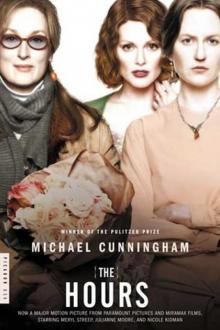 The Hours
The Hours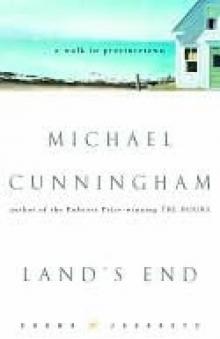 Land's End: A Walk in Provincetown
Land's End: A Walk in Provincetown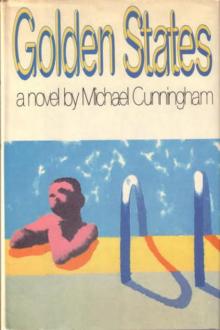 Golden States
Golden States A Wild Swan
A Wild Swan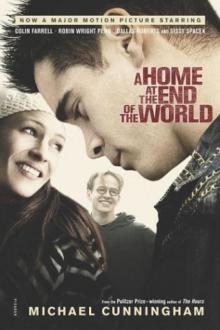 A Home at the End of the World
A Home at the End of the World Flesh and Blood
Flesh and Blood Specimen Days
Specimen Days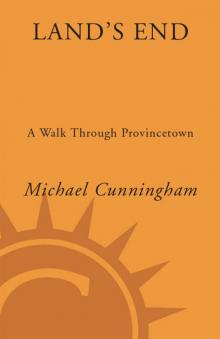 Land's End
Land's End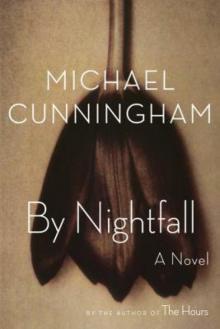 By Nightfall
By Nightfall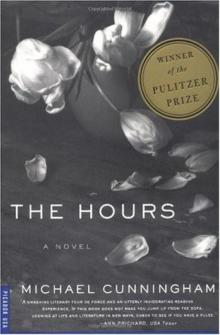 Hours
Hours